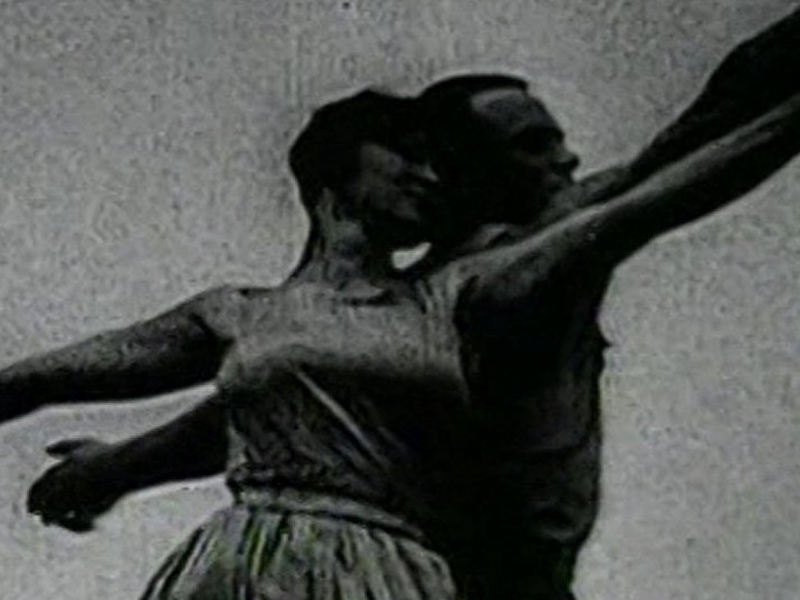
Chris Marker brings hommage to his friend and mentor Alexander Medvedkin. Doing so he considers the fate of communism and his own shortcomings.
“Well, many things have changed. Medvedkin is dead, for one. Sad as it is, I dare say he died on time. I met him on my way back from Tbilisi in ’88–both of us knew it was the last encounter–and he was beaming in the euphoria of pristine perestroika. ‘Telling the truth, asking people to participate, criticizing without fear, that’s what we always wanted, that’s what we tried to do in the days of the Train… ’. He belonged to that rarest breed who had kept unspoiled the faith of his youth: the tragedy of all these bloodstained years was just the sort of tricks History plays–but now the clouds had been wiped out, and perestroika was the way to achieve real, pure socialism… In a sense, he was the last Bolshevik. He played Majakovsky’s Klop in reverse: a genuine revolutionary artificially preserved to be shown ‘as it was’ to an incredulous audience. One year more, and he would have watched the ruin of his hopes.”
Chris Marker1
“I happened to be in the audience when Marker presented The Last Bolshevik at the San Francisco International Film Festival in 1993. I knew of his identification with cats and owls–evasive, predatory creatures–and his aversion to being photographed (the man can be glimpsed in a sake bar, hiding behind a napkin, in Wim Wenders’s Tokyo Ga). A surprise to see Chris Marker in the flesh, an impish figure, unaffected and even comical, with a quick stammering voice and a giddy air of agitation–a Gallic Woody Allen. I hovered in the small crown gathered around him after the screening. As if his shyness protected him from close scrutiny, I remember his hands better than his face. He was clutching his video camera, one of the earliest compact models, which he confessed to love and take with him everywhere, like a cherished pet. At one point he set it on a table (his knobby knuckles never far away) and, grinning, compared the camera to a cat. I wondered then–and still wonder, up to a point–why he chose to entrust the narration of his films to people with calm, neutral voices. The films would be so different if he narrated them himself! But maybe he considers his work already brimful with his own personality. Maybe he has a dream of himself as an objective, lucid, level-headed observer. Maybe he simply prefers to hear his words spoken by Alexandra Stewart. In any case, plainly enough Marker is intent on rejecting the false authority of routine documentary voiceover, trading standard (masculine) assurance for something quieter, deeper, more questioning, and, not incidentally, more poetic.”
Michael Almereyda2
“Parallels may be drawn with an indelible Marker to Godard’s archly aphoristic Histoire lessons [Histoire(s) du cinéma], as well as philosopher-cum-antifilmmaker Guy Debord’s cinematic negations: lines of influence, overlap, coincidental-or-not similarities. But what The Last Bolshevik demonstrates through its poignant saber-wit is what is missing from Godard and Debord–the tricky integration of the aesthetic, the historic, and the personal. Godard knee-jerks the aesthetic above other considerations, while Debord sought to dissolve cinema like clearing away so much rubbishy smoke-and-mirrors (even as he bathed his own legend in a romantic-nihilistic Harry Lime light). Marker’s self-effacement contrasts with the former’s cosmic self-regard (the singular devotion to propagating his aura of significance–‘Isn’t that so, Mr. Godard?’) and the latter’s imperious misanthropy (the would-be revolutionary with an Abel Gance-size Napoleonic complex, whose Situationist movement boasted more excommunicated members than ones in good standing). The Last Bolshevik is committed to both allusive density and plain speaking, to the multi-layered, many-faceted, and polyphonic, the superimposed frame within the frame and the abstract picture-in-picture, giving history’s witness enough breathing space to have their say. Marker believes in listening, in looking closely (at faces, montages, concepts), in linking generalizations to the paradoxes of the particular, and in questioning the virginal certainty behind so many assumptions of innocence. (Time and again, he shows the most effective obstacles against last century’s struggles for liberation coming from within, in those authoritarian-totalitarian impulses that hitched their hunger for power to utopian visions). Debord and Godard present unified narcissistic fronts, a more didactic mode of address: the solemn voice of artistic or theoretical authority tossing its elegant pearls before swine.
Marker will end The Last Bolshevik with a mournful, knock-knock non sequitur of a joke: ‘I know what you would call these men,’ it says of the final remnants of Soviet cinema’s long departed heroic era–‘Dinosaurs.’ A get-out-your-handkerchiefs pause. ‘But you know what happened to dinosaurs’–only instead of tar pits we get a shot of a smiling little girl cradling an inflatable Godzilla in her arms–‘Kids love ‘em.’ The absurd, footloose-in-quicksand spirit of Medvedkin’s Happiness returns here, as a strange buoyancy amid the Soviet Union’s collapse: the end of the line for a long-abandoned train, the tricks history plays coming home to roost. There’s no either/or in Marker, no split-level sacred/profane segregation: even in the agonized ecstasies of Tarkovsky, he uncovers a latent amusement, the existential ironies perched above the deader-than-deadpan zone between holiness and nothingness.”
Howard Hampton3
- 1Chris Marker, “The Last Bolshevik by Chris Marker”.
- 2Michael Almereyda, “Chris Marker: Deciphering the Future,” Film Comment, May-June 2003.
- 3Howard Hampton, “Chris Marker: Remembrance of Revolutions Past,” Film Comment, May-June 2003.

